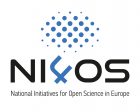NI4OS-Europe performed an extensive survey to capture the EOSC awareness and readiness status in South East Europe. A wide range of stakeholders has been identified and clustered on the basis of important Open Science functions: FUND – CREATE – SUPPORT – CONSUME – FACILITATE.
Information about stakeholders has been captured in an online map.
Data clustering
Funders and policymakers
Actors who fund research and, most commonly, shape research-related policies, including:
- Public sector research funders: government’s funding mechanisms supporting national research and innovation strategies and plans;
- Private sector research funders, i.e. individuals or organizations providing financial support for the creation and continuation of research programmes and initiatives;
The ones who perform research
- Research performing organizations: universities and HEIs: public and private sector organizations providing knowledge and education in studies covering all disciplines, from more theoretical to applied and interdisciplinary sciences;
- Research institutes / centres: public and private sector organizations producing new knowledge and technologies aimed at improving professionals’ and citizens’ life by providing flexible and innovative solutions to everyday need;
- Researchers: individuals (in all stages of their career);
- Research communities: groups of researchers undertaking research activities in domain-specific disciplines;
- Citizen scientists: anyone with direct or indirect participation in citizen science projects/initiatives;
- Data and OS enthusiasts: everyone interested in data and open science trends and developments;
The ones who support research
- Repositories;
- Research infrastructures, i.e. vertical infrastructures, are facilities, resources and services dedicated to domain-specific studies for use by relevant research communities;
- e-Infrastructures, i.e. horizontal infrastructures, are domain-agnostic facilities, resources and services adopted and utilized by a wider range of researchers;
- Service providers;
- Libraries, esp. academic and research libraries;
The ones who “consume” research
- SMEs, i.e. small and medium-sized start-ups and other companies which could benefit from the use of open technologies and open data in creating new products and new technologies;
- Citizens: the public; people who are legally part of countries’ population;
Open Science facilitators, including OS initiatives
- International nodes, coordinators and other structures;
- every beneficiary representing European or national initiatives for OS with an aim to inspire and support OS policies and practices nationally and their alignment with EU.
OS Stakeholder Map features
The map supports filtering per country and stakeholder group. The zoom functionality enables users to find the precise locations of stakeholders. Each stakeholder is marked with a pin and a tooltip showing the organization’s name and a link to its website.
The collected dataset, which includes information about 1010 stakeholders (968 unique entities), is deposited in Zenodo under a free license: https://doi.org/10.5281/zenodo.3722929.
